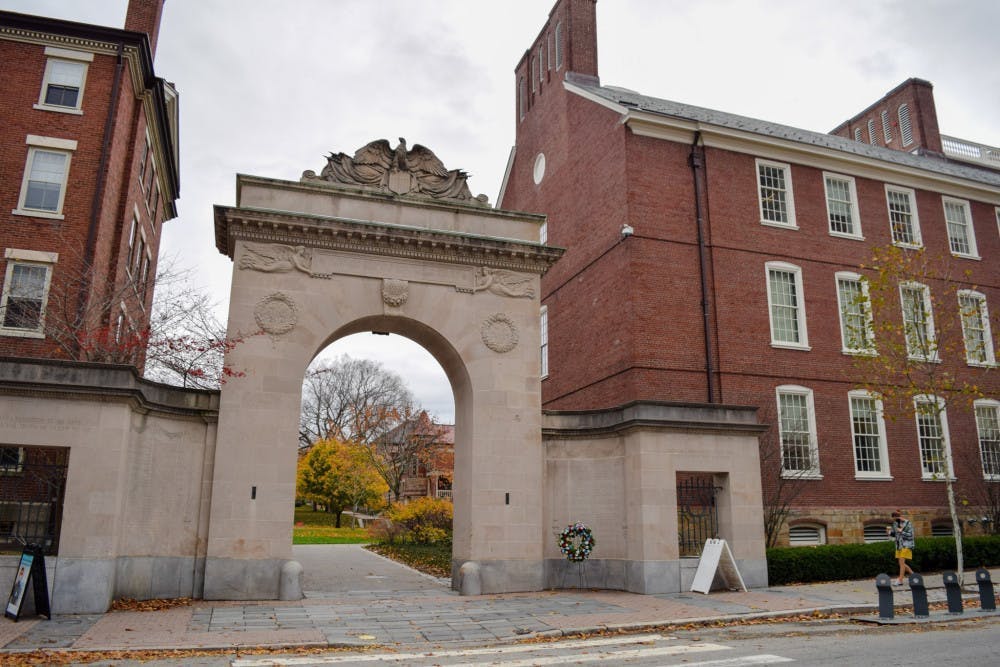In a Tuesday evening conversation hosted by the LGBTQ Center and the Office of Military-Affiliated Students, community members reflected on the 10-year anniversary of the repeal of “don’t ask, don’t tell,” a U.S. military policy which banned openly gay, lesbian and bisexual individuals from military service but also prohibited harassment of or discrimination against closeted service members.
The conversation was held as part of OMAS’s Salute to Service Week and featured Jennifer Dane, former intelligence analyst for the U.S. Air Force and executive director of the Modern Military Association of America, “a nonprofit organization working to advance fairness and equality for the LGBTQ military and veteran community,” according to the event description.
“Don’t ask, don’t tell” was implemented by President Bill Clinton’s administration Feb. 28, 1994. The policy was part of an effort from Clinton’s to follow up on campaign promises to expand gay rights but was limited to supporting closeted individuals as the administration faced political opposition from gay rights opponents.
In her tenure with the U.S. military, Dane experienced “don’t ask, don’t tell” and felt its ramifications firsthand as an LGBTQ individual.
While serving in the Air Force, Dane was sexually assaulted and went through the process of reporting and investigating the assault with the military. However, her sexuality came up as a topic of discussion, and she was forced to navigate homophobic discrimination within the investigation process that scrutinized her identity instead of focusing on the actions of the man who assaulted her. While the investigation ended when the policy was eventually repealed, Dane said its legacy still shaped her experience within the military.
“Don’t ask, don’t tell” was a “policy intended for good,” but due to oversights in how it would affect LGBTQ individuals, it ultimately was “more harmful for (me) in the long run,” she said at the event.
After Clinton was elected, many members of the LGBTQ community “felt hope, and it all kind of backfired in our faces,” said Kelly Garrett, director of the LGBTQ Center, at the beginning of the event. For Garrett, “don’t ask, don’t tell” was a “terrible compromise that hurt a lot of people.”
In 2011, President Barack Obama formally repealed the policy, although transgender individuals continued to face discrimination while serving in the U.S. military — transgender people were banned from serving under Trump-era policies, which were revoked by President Biden.
Dane noted that the repeal of the Clinton-era policy made it easier for individuals in same-sex relationships who experienced domestic or intimate partner violence to report their experiences without fear of being scrutinized for their sexuality.
The repeal of the policy sparked new conversations at Brown, too, amid discussions surrounding the presence of the Reserve Officers’ Training Corps on campus, a program that was discontinued on College Hill in 1969. When the University created a committee to analyze the potential reinstatement of the program in 2011, critics of ROTC expressed concern about the failure of the repeal of “don’t ask, don’t tell” to support transgender individuals in the U.S. military and wanted to limit the presence of military-affiliated programming like ROTC on campus, former University President Ruth Simmons explained in an Oct. 19, 2011 letter to the Brown community.
Following her service in the military, Dane became involved in advocacy for LGBTQ veterans and active-duty service members. Today, the Modern Military Association of America works to support the LGBTQ military-affiliated community, making sure the military is “as inclusive as possible,” she said. Her organization’s initiatives include increasing advocacy for transgender individuals in the military, who still face extreme discrimination and barriers to entry in their service.
“‘Don’t ask, don’t tell’ was only effective for people who identified as lesbian, gay or bisexual,” Dane said. “It was never intended to protect transgender individuals.”
Because of this, Dane emphasized the importance of codifying protections for transgender service members into law to minimize further discrimination. “There’s a lot of trans folk who do serve, who should be capable of serving with honor and dignity,” she added. Dane’s organization also works to advocate for intersex and HIV-positive individuals, who remain banned from military service.
While she said the repeal of “don’t ask, don’t tell” was a step in the right direction, Dane noted that discrimination against LGBTQ individuals in the military persists, and argued that the government has not sufficiently supported LGBTQ veterans who were discharged under the policy.
According to Dane, during the years of “don’t ask, don’t tell,” 114,000 individuals were dishonorably discharged from the military for “homosexual conduct.” After the policy’s repeal, their status of being dishonorably discharged was not overturned. Dishonorable discharges from the military do not receive access to medical care, financial support and other benefits the U.S. government has in place for veterans.
Dane works with veterans discharged under “don’t ask, don’t tell” to help them “upgrade” their discharges to access veterans’ benefits. But she still urges legislators to codify laws that will do this automatically without requiring veterans to appeal their discharges.
Despite steps in the right direction, Dane and Garrett agreed there is room to better support LGBTQ veterans, especially in the wake of “don’t ask, don’t tell.”
“There’s a really long history of service members who have served our country and are LGBTQ,” Garrett added.
Dane maintains hope that one day the experience of LGBTQ veterans will be better, with more support in place for them. “It just takes time,” she said.

Jack Walker served as senior editor of multimedia, social media and post- magazine for The Herald’s 132nd Editorial Board. Jack is an archaeology and literary arts concentrator from Thurmont, Maryland who previously covered the Grad School and staff and student labor beats.





